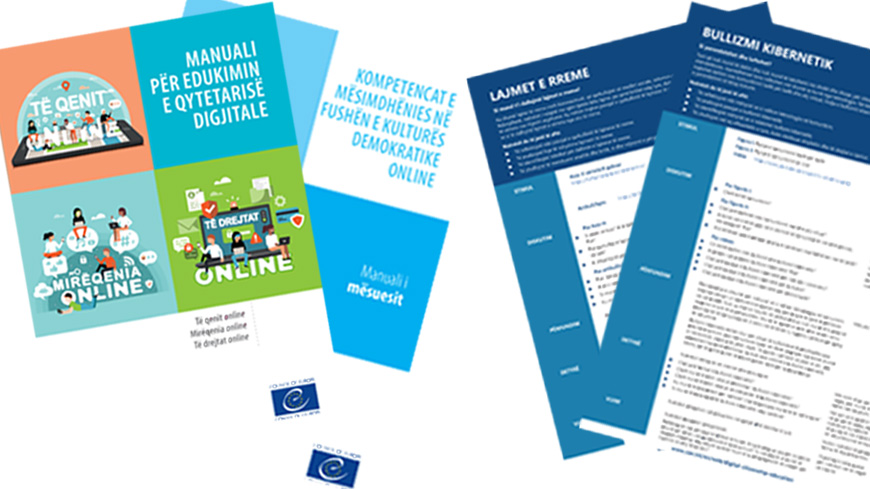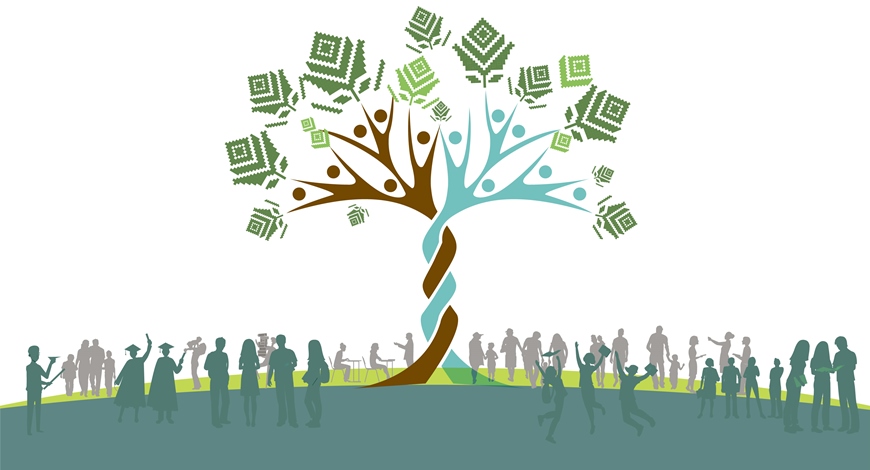Good practices from our projects

Since December 2019, the project Strengthening Democratic Citizenship Education in Albania has been supporting the Ministry of Education, Sports and Youth to improve the quality of democratic citizenship education in Albania through Council of Europe standards and practices.
To address some of the challenges created by the COVID-19 pandemic, the project has prepared, adapted and translated into Albanian a number of Council of Europe publications on ensuring democratic citizenship education in times of crisis. More than 500 hard copies of the Manual for Teachers: teaching competences for democratic culture online, 500 copies of Digital Citizenship Handbook and 1800 copies of Digital Lesson Plans were distributed to the Albanian education community. The Manual provides teachers and parents with concrete ideas and examples of activities to develop competences for democratic culture online. The Lesson Plans aim to help young learners discuss important issues around the COVID-19 pandemic focusing on staying safe online, adopting responsible civic behaviour, combating on-line hate speech, discrimination and bullying.

Manual for teachers – Teaching Competences for Democratic Culture online
This manual has been developed at a time unlike any time ourselves or our children have known, at a time when streets and school buildings are empty, life is filled with uncertainty and fears, and our gaze is focused on TV screens and social networks. Nevertheless, it is a time when, more than ever, a large number of people are questioning their attitudes and their values and are taking the opportunity to gain new knowledge and skills.
Following the closure of schools in Bosnia and Herzegovina, the ban on gatherings and social distancing policy, it was necessary to find a rapid solution to the new challenge - how to maintain the teaching process, how to enable children to continue learning, and how to preserve pupils' mental health. This is what this manual is about - human attitudes and values that the pupils need to succeed in keeping this world a place where they all belong equally, in which they are respected and protected, and in which they connect to strong communities ready to meet the challenges. Read more

Since January 2019, the Project “Education for Democracy in the Republic of Moldova” has supported the Ministry of Education, Culture and Research of the Republic of Moldova implement the new civic education curriculum “Education for Society”, developed with Council of Europe expert support and based on the Council of Europe’s Reference Framework of Competences for Democratic Culture.
An intensive capacity building programme for education professionals on the new curriculum and the new teaching, learning and assessment methods has been a key element of this support. In the school year 2019/2020, four rounds of training sessions for national teacher trainers of the Ministry of Education, Culture and Research were envisaged. The final round was planned for the end of March, however, due to the COVID-19 pandemc, the schools closed in mid-March and all face to face activities had to be cancelled. Read more

Online coordination meetings with mentor schools
Despite the fact that COVID-19 brought about a halt to almost all usual activities of majority of people, schools participating in the joint European Union/Council of Europe project „Quality Education for All“ have found the way to keep the process of introducing the competences for democratic culture going on.
We realise that the need for understanding, tolerance and empathy is stronger than ever in the time of crisis and that those values need to be nurtured at all times. Which is exactly what we continue to do. In order to stay informed and maintain the coordinated approach, together with our local coordinators we have organised the first two online meetings with all 40 mentors from 20 mentor schools in Serbia on 21 and 22 April. The aims of the meetings were to share and discuss key findings of the inception visits to 40 new participating schools, present key information of the new schools and define areas of cooperation.
The coordinators and mentors also shared their experiences regarding the specificities of the new schools, fields to be focused on and discussed other issues in order to develop and maintain unified approach. The second part of the meetings was focused on presentation and discussion of the revised workplan put in place to bridge the crisis while fully maintaining the work. In the end, we brainstormed the activities that were postponed and planned their implementation. All our mentors confirmed they were eager to continue the work with the new colleagues - the work that is trully inspiring and, as we saw from numerous examples in their own schools, often life changing!

Supporting schools in times of COVID-19 - INSCHOOL solutions
Since 2017, the INSCHOOL Joint Project of the European Union and Council of Europe (“Making a difference for Roma children”) has been working in several EU Member States at both the practice and policy level, with the aim of ensuring a broader understanding and use of quality inclusive education at system level.
In 2020, the second cycle of implementation kicked off in nearly 30 schools, however, the usual methodology - based on the “Index of Inclusion: a guide to school development led by inclusive values” by Tony Booth and Mel Ainscow (4th edition) was put on hold by the arrival of the COVID-19 pandemic.
Nonetheless, the network of Facilitators and Educational Advisors maintained contact with schools during this time and proceeded with a brief needs’ assessment as soon as March 2020. Based on the needs voiced by schools, and in agreement with partners in the European Commission, small grants of up to 2000 € are now available to schools within the INSCHOOL network, with the specific aim of ensuring equal access to quality inclusive education and educational outcomes for all children and in particular children in vulnerable situations (Roma, other minorities, children with special education needs, disabled children, with parents abroad, in poverty). The dedicated small grants for schools aim to support some of the following:
- Capacity building of school staff and teachers in using ICT and online platforms for more effective learning and pupil's engagement;
- Support and coaching of teachers and schools in improving their remote contact and communication with parents and children;
- Emotional and psychological support for teachers, parents and students in overcoming the anxiety brought by the confinement and physical isolation;
- Effective and post-lockdown support for children and teachers in their transition back to schools and classrooms.



